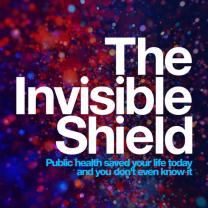The Invisible Shield
The Invisible Shield

-
Premiered:
- Network: PBS
- Category: Series
- Genre: Documentary
- Type: Live Action
- Concept:
- Subject Matter: Medical
- Tags:
Buy This Show on DVD or Watch Online
No DVDs Available
(That We Know Of)
(That We Know Of)
Legal Full Episodes
Not Available Online
(That We Know Of)
Not Available Online
(That We Know Of)
Plot Synopsis
THE INVISIBLE SHIELD is a four-part documentary that reveals how the field of public health has saved countless lives in the United States, protecting people from the constant threat of disease and increasing lifespans. The series explores the hidden public health infrastructure that makes modern life possible. It highlights the thousands of unsung heroes -- physicians, nurses, scientists, activists, reformers, engineers, and government officials -- who work together to improve health outcomes, from the days of cholera and smallpox through the most recent battle with COVID-19. Using character portraits, interviews, and archival elements, THE INVISIBLE SHIELD shows that public health is a progressive and revolutionary movement, whose successes have traditionally come from a diverse, cross-disciplinary coalition of dedicated public servants, all working together to improve the conditions of society. Offering insights from previous pandemics and public health crises -- cholera, smallpox, HIV/AIDS, the opioid overdose crisis, and more -- the series looks to history to show how public health practices have emerged over centuries as humanity confronted problems arising from urbanization, industrialization, and globalization. It examines public health's major achievements -- including the more than 30-year increase in life expectancy between 1900 and 2000 and the eradication of smallpox in the 1970s. Public health challenges are also explored, including the COVID-19 pandemic, which highlights how misunderstood, undervalued, and underfunded public health is. Episodes include:
"The Old Playbook" (Tuesday, March 26, 2024 at 10pm): Public health has transformed human life, silently protecting us from disease and fatalities. Interventions large and small -- from quarantines to crosswalks, vaccines to modern sanitation -- have allowed American society to flourish and keep illness, injury, and death at bay. When the global pandemic emerges in 2020, the once-invisible shield of public health is quickly overburdened and at the center of a heated debate about its purpose and role in society. Public health officials work against a ticking clock to implement a playbook that has been adapted and refined since the 14th century.
"Follow the Data" (Tuesday, April 9, 2024 at 10pm): Data has been an essential public health tool since at least the 17th century, when cities began regularly recording mortality statistics. Data science has guided public health policy since the earliest practices of data collection in the 1800s to identify the spread of disease. It continues to be critical to public health workers as they fight the COVID-19 pandemic. But with public health authority delegated to the 50 states, forming a national response to the virus proves difficult.
"Inoculation & Inequity" (Streaming Tuesday, March 26, 2024): U.S. public health officials face the headwinds of disinformation, science skepticism, and government distrust as they begin the monumental task of vaccinating the public against COVID-19. These obstacles, coupled with historical injustices and inequities in communities of color, lead to significant public apprehension, forcing public health officials to refine their approach. From the early days of inoculation in the late 1700s through the rapid development of the COVID-19 vaccine, scientists have achieved extraordinary feats to combat, contain, and eradicate disease -- but solutions only work if people trust the science.
"The New Playbook" (Streaming Tuesday, March 26, 2024): In 2019, the U.S. was ranked by the Global Health Security Index as the country best positioned to manage an infectious disease outbreak. Less than a year later, the U.S. proved uniquely vulnerable to the COVID-19 pandemic. Inequality, structural racism, inadequate health care access, insufficient job protections, and a badly neglected public health system all contributed to catastrophic systemic failures. Excess mortality, on the rise before 2020, surged during the pandemic. These "deaths of despair" -- often associated with suicide, drug use, and alcohol misuse -- represent a social fracturing and a loss of hope across communities.
Production & Distribution
- Produced by @radical.media
